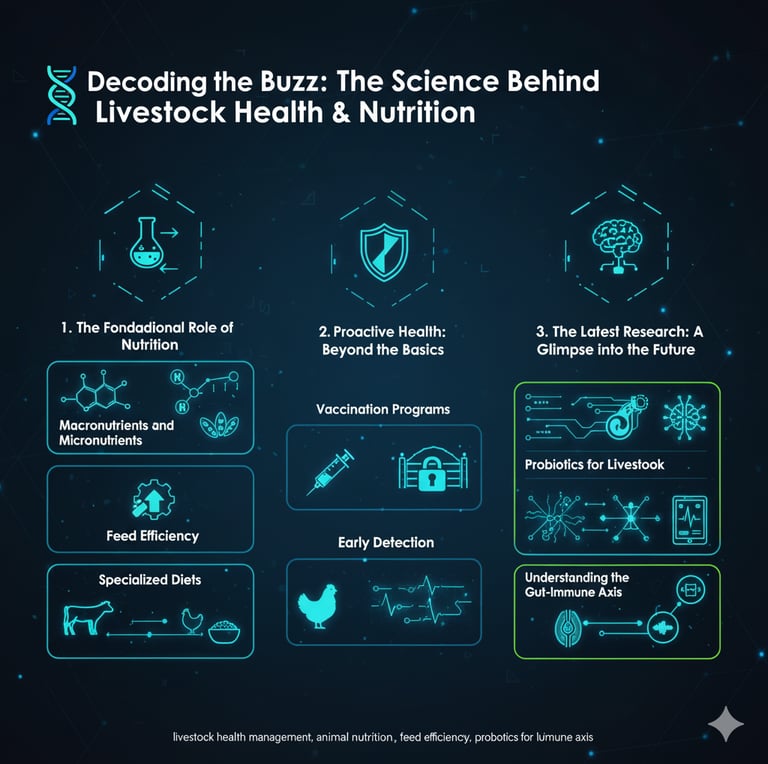Decoding the Buzz: The Science Behind Livestock Health & Nutrition
Decoding the Buzz: The Science Behind Livestock Health & Nutrition In the world of farming, a healthy animal is a productive animal. It's a fundamental truth that the profitability of an operation and the quality of its products are directly tied to the well-being of the livestock. This isn't just about good care; it's a precise science that hinges on two core pillars: livestock health management and animal nutrition. These aren't separate concepts but rather two sides of the same coin. A well-nourished animal is better equipped to fight off disease, and a healthy animal can efficiently convert feed into growth and production. Let's delve into the science behind keeping farm animals in peak condition. The Foundational Role of Nutrition Think of nutrition as the blueprint for an animal's health. The right diet provides the building blocks for growth, a strong immune system, and optimal performance. It's about more than just filling a trough; it's about providing a carefully balanced diet tailored to the animal's specific needs. Macronutrients and Micronutrients: Like humans, livestock require a mix of macronutrients (proteins, carbohydrates, fats) and micronutrients (vitamins and minerals). For example, calcium is crucial for bone development in growing animals and eggshell quality in poultry, while protein is vital for muscle growth and milk production. Feed Efficiency: This is a critical metric in modern farming. Feed efficiency measures how well an animal converts feed into a desired product, such as meat, milk, or eggs. A balanced diet improves feed efficiency, which reduces feed costs and the environmental impact of the operation. Specialized Diets: An animal's nutritional needs change throughout its life. A young calf requires a different diet than a lactating dairy cow, just as a laying hen has different needs than a broiler chicken. Tailoring diets to specific life stages and production goals is a key aspect of modern animal nutrition. Proactive Health: Beyond the Basics While a good diet provides a strong foundation, it's not the only piece of the puzzle. Proactive livestock health management is essential for preventing disease outbreaks and ensuring the overall farm animal well-being. Vaccination Programs: One of the most effective tools in disease prevention for livestock is vaccination. . Just as with humans, vaccines prepare an animal's immune system to fight off specific pathogens, protecting individual animals and the entire herd from devastating diseases. A robust vaccination schedule, often designed by a veterinary care farm animals specialist, is non-negotiable for most commercial operations. Biosecurity: Preventing disease from entering and spreading on the farm is a top priority. This includes measures like controlling access to the farm, disinfecting equipment, and quarantining new animals. A strict biosecurity protocol can protect a herd from common diseases as well as from more serious, fast-spreading illnesses. Early Detection: The sooner a health issue is identified, the easier it is to treat. Farmers and herdsmen are trained to look for subtle signs of illness or distress. Advancements in technology, like health monitoring sensors and automated feeding systems, can provide real-time data to alert farmers to changes in an animal's behavior or vital signs, enabling quicker intervention. The Latest Research: A Glimpse into the Future The field of animal nutrition and health is constantly evolving, with new research pushing the boundaries of what's possible. One of the most exciting areas of study is the use of feed additives to improve health from the inside out. Probiotics for Livestock: Just as they are for humans, probiotics (beneficial microorganisms) are gaining popularity in animal agriculture. . When added to feed, probiotics for livestock can help balance the gut microbiome, which is essential for nutrient absorption and a strong immune response. Research shows that probiotics can reduce the need for antibiotics, improve feed efficiency, and even decrease the spread of certain pathogens. Understanding the Gut-Immune Axis: Scientists are doing a deeper dive into the intricate connection between an animal's gut health and its overall immune function. A healthy gut lining acts as a barrier against pathogens, and a balanced gut microbiome can enhance an animal's ability to respond to disease challenges. This research is paving the way for targeted nutritional strategies to bolster immunity. In conclusion, the science of raising healthy livestock is a dynamic field that combines meticulous nutrition planning with proactive health management. From carefully formulated diets to advanced vaccination programs and cutting-edge feed additives, modern farmers are embracing a holistic approach to farm animal well-being. This focus not only improves efficiency and profitability but also ensures a safe, high-quality food supply for a growing global population.
Mr. Diyan Ahmed
9/24/20251 min read


Connect
Partnering for innovation across industries.
Explore
Discover
+923001534092
© 2025. All rights reserved.
